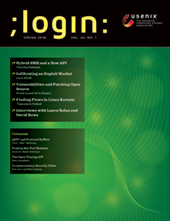
Secure Client and Server Geolocation over the Internet
;login: Enters a New Phase of Its Evolution
For over 20 years, ;login: has been a print magazine with a digital version; in the two decades previous, it was USENIX’s newsletter, UNIX News. Since its inception 45 years ago, it has served as a medium through which the USENIX community learns about useful tools, research, and events from one another. Beginning in 2021, ;login: will no longer be the formally published print magazine as we’ve known it most recently, but rather reimagined as a digital publication with increased opportunities for interactivity among authors and readers.
Since USENIX became an open access publisher of papers in 2008, ;login: has remained our only content behind a membership paywall. In keeping with our commitment to open access, all ;login: content will be open to everyone when we make this change. However, only USENIX members at the sustainer level or higher, as well as student members, will have exclusive access to the interactivity options. Rik Farrow, the current editor of the magazine, will continue to provide leadership for the overall content offered in ;login:, which will be released via our website on a regular basis throughout the year.
As we plan to launch this new format, we are forming an editorial committee of volunteers from throughout the USENIX community to curate content, meaning that this will be a formally peer-reviewed publication. This new model will increase opportunities for the community to contribute to ;login: and engage with its content. In addition to written articles, we are open to other ideas of what you might want to experience.

We provide a summary of recent efforts towards achieving Internet geolocation securely, that is, without allowing the entity being geolocated to cheat about its own geographic location. Cheating motivations arise from many factors, including impersonation (if locations are used to reinforce authentication) and gaining location-dependent benefits. In particular, we provide a technical overview of Client Presence Verification (CPV) and Server Location Verification (SLV)—two recently proposed techniques designed to verify the geographic locations of clients and servers in real time over the Internet. Each technique addresses a wide range of adversarial tactics to manipulate geolocation, including the use of IP-hiding technologies like VPNs and anonymizers, as we now explain.
